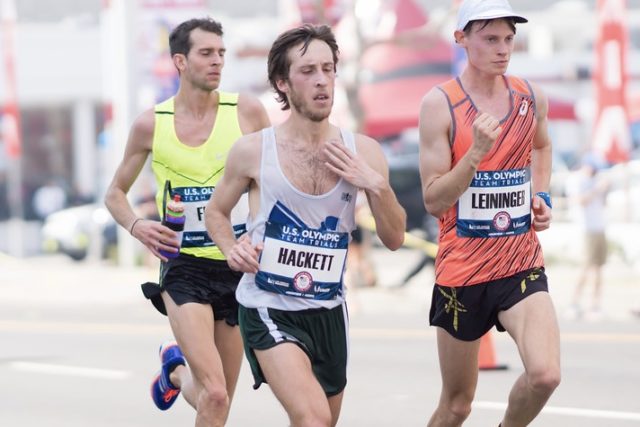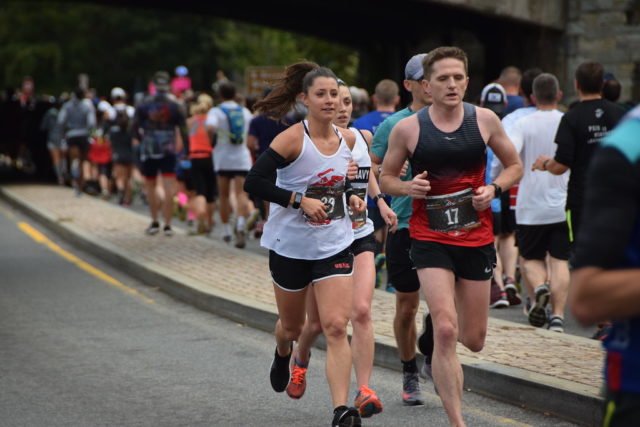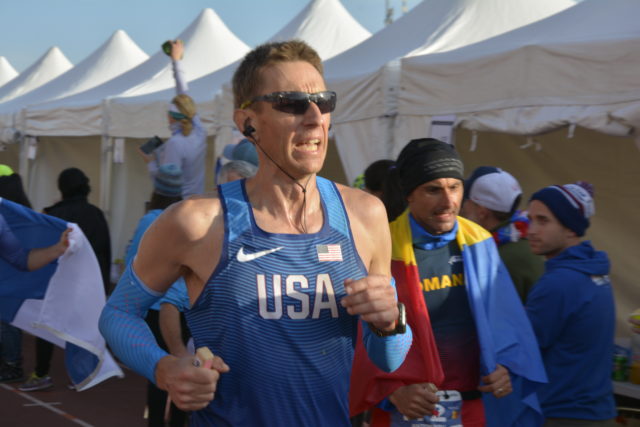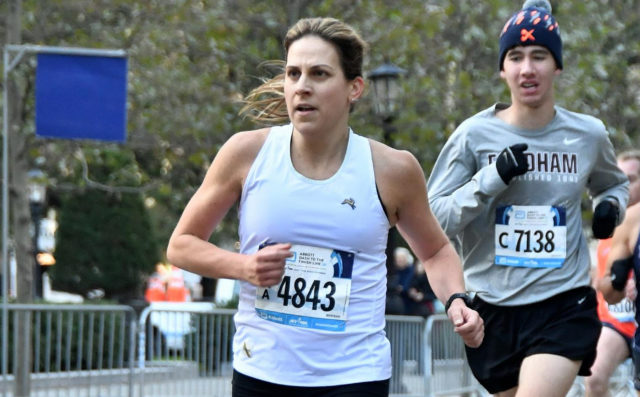A former West Point classmate needed a new kidney, and Dave Ashley did a blood test to see if he was a match.
After further testing, it turned out he was. But when he tried to research whether he’d be able to keep doing endurance sports, which helped him with anxiety issues resulting from deployment, he wasn’t able to find answers.
“So I really had to make this decision kind of blindly, hoping that on the other end I’d still be able to do at least some of the activities that I’m really passionate about and are therapeutic for me,” said Ashley, now 46, who lives in Arlington.
This coming January will mark four years since the now-retired U.S. Air Force colonel donated his kidney — and he’s showing that living with one kidney isn’t stopping him as he completes athletic feats, from ultramarathons to bike rides.
A Walt Whitman runner is getting a bone marrow transplant, but will need help from blood and platlet transfusions.
Ben Lesser got a major boost in his fight acute myeloid leukemia when the National Marrow Donor Program yielded a partial match.
Try this again! The power of athletics! #WeRaise #wwtf4life @WWHSAthletics @mcpsAD @MCPSAthletics pic.twitter.com/CATLMlSDBw
— Stephen Hays (@WWXCCoach) April 15, 2020
Help Ben
Donate blood
You can donate whole blood every 56 days. Lesser can accept A negative, B negative, AB negative and O negative.
Donate platlets
You can donate platelets every 7 or 14 days. In D.C., at the Donor Center at Children’s National Hospital, you can donate platelets every 14 days. Around the country, you can donate platelets every 7 days at the Red Cross (see the Red Cross website). If you have ever been pregnant, you may need to have an HLA test first.
Send Ben a card or note:
Ben Lesser
6106 Harvard Ave. PO Box 607
Glen Echo, MD 20812
If you’d like to organize a group of people to donate blood, or if you simply prefer to speak to someone, please call the Donor Center at Children’s National Hospital at 202-476-5437.
Dani Micsan’s name may sound familiar to local runners in the female 60-64 age group.
Micsan, who lives in Reston, turned 60 in early 2019 and won her age group at the Reston 10 Miler on March 3 that year. The next Sunday, she won her age group again at the Pot O’Gold 10K. One week later, she placed second in her age group at the Lucky Leprechaun 5K.
And plenty more age group honors followed.
“Last year, all I did was train for different races,” said Micsan, who is now 61.
And, she got faster, too.
Dan Frank hadn’t done the training he normally would have for an ultramarathon, and he didn’t have a route planned. There were some tough points during his run, which lasted nearly a day.
But the Columbia resident and Paint Branch High School math teacher had plenty to keep him going as he ran about 102 miles in a fundraiser for the Community Action Council of Howard County, which includes the Howard County Food Bank.
The idea came about when Frank and his wife were on a walk. Their daughters’ school, Phelps Luck Elementary, usually has a mobile food pantry available one day per month, he said. But now, schools are closed because of the coronavirus pandemic.
“In good times, about 40 families show up every time we have that mobile food pantry, and I can’t imagine what it would be like now, with how many people have lost their jobs and everything,” Frank said.
Five days after having pacemaker surgery, DC Road Runners Club President Ben Richter was running the streets of Columbia at the Maryland-District of Columbia RRCA 10 Mile Club Challenge.
The Capitol Hill resident had been given some restrictions, but running wasn’t among them.
“They hadn’t told me not to, so let’s go out and test out the new equipment and see how the toys work,” said Richter, now 63.
That was in 2019, after a trip to the doctor led to a same-day surgery to have the pacemaker put into his body.
At the 2019 Road Runners Club of America Club Challenge, Richter decided to call it a day and head back to Howard Community College after a little more than four miles because of the bad weather.
But this year at the race, which was Feb. 23, he finished in a chip time of 1:49:25 — five seconds faster than his 2018 time on the hilly Club Challenge course.
When Richter’s doctor told him he needed a pacemaker, his reaction was “What?”
Usually, running coach Kathy Pugh’s More than Miles Bootcamp group doesn’t cross streets for their runs, but Pugh said when they do, Roberta Stewart is there to serve as “safety patrol.”
Even if there are no cars coming, Stewart backs Pugh up on not crossing without a “walk” signal.
This behavior is something Stewart sees in D.C., along with drivers not always stopping at lights.
For pedestrians, it’s better to wait than risk crossing to get to the other side a little faster, she said.
“It is absolutely worth it to wait those 30 seconds,” Stewart said. “It’s not worth it to say I’m in a hurry. Because that car is going to win against your body every time.”

Racing a cross country 10K six days after running an Olympic Marathon Trials qualifying time isn’t exactly a conventional decision, but Everett Hackett isn’t exactly a conventional guy.
He ran cross country and track at George Mason University, and his college coach, Andrew Gerard, said Hackett doesn’t have a filter or care what others think.
“As a person, he’s probably one of the most unique young men that I’ve ever interacted with,” said Gerard, who is the director of track and cross country at George Mason.
Hackett, who is 29 and lives in Connecticut, wasn’t originally planning to run the USATF National Club Cross Country Championship in Bethlehem, Pa., on Dec. 14. But members of his team, the Hartbeat Track Club, were excited about running it, he said, and it became a joke as to whether he’d actually run it so soon after his marathon.
He did, and while he said he could have run faster if he was just training for the 10K race, he still ran 33:47 on the extremely muddy course.
“I had to do it for my team, and it was fun too – I had a blast,” he said.

It took U.S. Marine Corps Capt. Lindsay Carrick two hours and 43 minutes (and 43 seconds) to run the Military World Games marathon in Wuhan, China. It took more than three weeks to find out her effort was good enough to qualify for the Olympic Marathon Trials.
But the course and race management checked out, and it made the fall and winter a lot simpler for Carrick, who had been aiming to run under 2:45 for two years.
Her coach, Patrick Gomez, said the Olympic Trials qualifying time was a larger goal, but he wanted her to be able to do well at the Military World Games without overdoing it. They had a backup race planned if needed.
“We went into the race saying let’s set ourselves up to be as successful as possible, and it just happened to be an Olympic Trials qualifying mark,” he said.

Olivier Leblond of Arlington was having a great day at the 24-Hour World Championships in Albi, France.
He still felt good through the first 100 miles. But once it got to be 2:30 a.m., and he’d been running for more than 16 hours, he said, it was tough to think about having more than seven hours of running left. Still, he kept going.
“You get tired until you see the sun,” said Leblond, 47.

Jessica McGuire didn’t qualify for the Olympic Marathon Trials on raw talent. It took hard work.
That’s according to her coach, Jerry Alexander, who coaches the Northern Virginia Running Club.
“She has maximized her ability like no other athlete I’ve ever worked with,” he said.
Alexander didn’t initially think that running an Olympic Marathon Trials qualifying time of 2:45 or below was realistic. McGuire was able to bring her personal record, then 3:13, down to 2:55 at the 2016 Chicago Marathon. But even from there, qualifying for the Trials would still mean getting her time down by more than 10 minutes.

